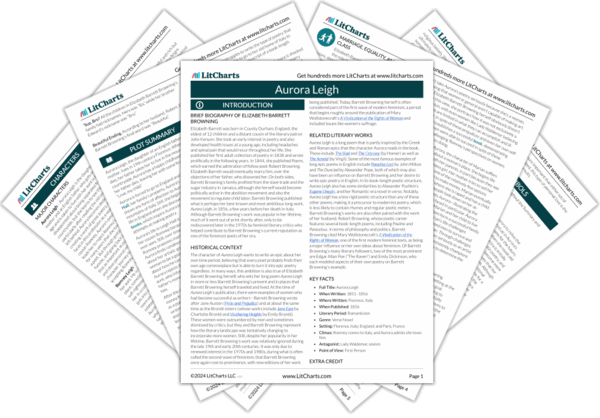Leigh Hall, the longtime home of the Leigh family in England that Aurora goes to live in after the death of her father and mother, symbolizes the emptiness of wealthy English life. Initially, Leigh Hall is the residence of Aurora’s aunt, who takes her in after she’s orphaned in Italy. Although the hall is large and impressive, Aurora still longs to be back in the mountains of Italy. The contrast of Aurora’s beautiful home in Italy with her depressing new one in England reflects how the relationship she had with her father was full of affection, while her relationship with her aunt is much colder. Leigh Hall represents the rigid, traditional culture of England, and one of these traditions turns out to be patriarchy—Aurora has no claim to her family home, which will go to the male heir, Romney, after her aunt’s death.
After Aurora leaves Leigh Hall for good, Romney has his own ideas about how to change Leigh Hall’s legacy: he wants to turn it into a shelter for the poor. While this idea might seem generous, Romney is arrogantly convinced that he’s capable of changing the whole world, and this leads him to set his scope too wide rather than dealing with people on a personal level. In the end, Romney’s plan to transform Leigh Hall fails spectacularly, as neighbors who dislike the commotion break windows, and ultimately, the place burns down to ashes. Romney’s failure to transform Leigh Hall reflects his own personal shortcomings but also illustrates how difficult it is to change the ingrained traditions of upper-class life in England. Leigh Hall represents the coldness and emptiness of upper-class life in England, and Romney’s failure to transform the hall into a welcoming place for the poor reflects both how misguided he is and how difficult it is to change traditional values.
Leigh Hall Quotes in Aurora Leigh
She had lived
A sort of cage-bird life, born in a cage,
Accounting that to leap from perch to perch
Was act and joy enough for any bird.
Dear heaven, how silly are the things that live
In thickets, and eat berries!
I, alas,
A wild bird scarcely fledged, was brought to her cage,
And she was there to meet me. Very kind.
Bring the clean water; give out the fresh seed.
‘I go hence
To London, to the gathering-place of souls,
To live mine straight out, vocally, in books;
Harmoniously for others, if indeed
A woman’s soul, like man’s, be wide enough
To carry the whole octave (that’s to prove)
Or, if I fail, still, purely for myself.
Pray God be with me, Romney.’
When Romney Leigh and I had parted thus,
I took a chamber up three flights of stairs
Not far from being as steep as some larks climb,
And, in a certain house in Kensington,
Three years I lived and worked. Get leave to work
In this world,—’tis the best you get at all;
For God, in cursing, gives us better gifts
Than men in benediction. God says, ‘Sweat
For foreheads;’ men say ‘crowns;’ and so we are crowned
I rode once to the little mountain-house
As fast as if to find my father there,
But, when in sight of’t, within fifty yards,
I dropped my horse’s bridle on his neck
And paused upon his flank. The house’s front
Was cased with lingots of ripe Indian corn
In tesselated order, and device
Of golden patterns: not a stone of wall
Uncovered,—not an inch of room to grow
A vine-leaf. The old porch had disappeared;
And, in the open doorway, sate a girl
At plaiting straws,—her black hair strained away
To a scarlet kerchief caught beneath her chin
In Tuscan fashion,—her full ebon eyes,
Which looked too heavy to be lifted so,
Still dropt and lifted toward the mulberry-tree
[…]
Enough. My horse recoiled before my heart—
I turned the rein abruptly. Back we went
As fast, to Florence.
‘Ah, my friend,
You’ll learn to say it in a cheerful voice.
I, too, at first desponded. To be blind,
Turned out of nature, mulcted as a man,
Refused the daily largesse of the sun
To humble creatures! When the fever’s heat
Dropped from me, as the flame did from my house,
And left me ruined like it, stripped of all
The hues and shapes of aspectable life,
A mere bare blind stone in the blaze of day,
A man, upon the outside of the earth,
As dark as ten feet under, in the grave,—
Why that seemed hard.’












